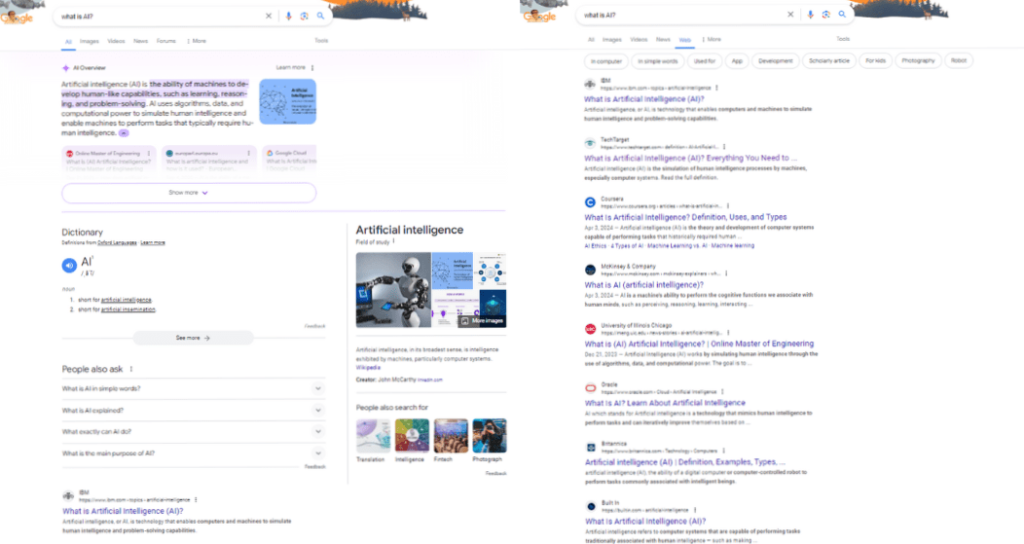How Google Trains Its Search AI Even With Website Opt-Outs

Table of Contents
Data Sources Beyond Indexed Websites
Even with website opt-outs, Google possesses an enormous wealth of data to fuel its search AI's learning. This data, far exceeding indexed websites, allows for a comprehensive and nuanced understanding of information.
Publicly Available Data
Google leverages vast quantities of publicly available data for training its algorithms. This acts as a foundational layer of knowledge, providing context and understanding far beyond the limitations of indexed websites.
- Books: Millions of digitized books contribute to the AI's understanding of language, facts, and historical context.
- Research Papers: Academic publications provide cutting-edge knowledge across various disciplines.
- News Articles: Current events and diverse perspectives shape the AI's understanding of real-time information.
- Government Documents: Official records and data provide reliable information on policies, regulations, and statistics.
- Open-Source Code Repositories: Code repositories contribute to the AI's understanding of programming languages and software development.
This vast dataset ensures the Google Search AI possesses a broad and comprehensive knowledge base, enriching its ability to answer complex queries even without access to specific opted-out websites.
User Interactions
User behavior is another crucial component of Google Search AI training. Analyzing user interactions provides invaluable insights into search intent and the effectiveness of search results.
- Search Query Analysis: Analyzing the phrasing, keywords, and frequency of search queries helps Google understand what users are looking for.
- Click-Through Rate (CTR) Data: Analyzing click patterns reveals which results are most relevant and useful to users.
- User Feedback Mechanisms: Explicit feedback like ratings, reviews, and "thumbs up/down" signals helps Google gauge user satisfaction and fine-tune its algorithms.
This behavioral data is instrumental in improving the relevance and accuracy of search results, making the search experience more efficient and satisfying for users.
Knowledge Graphs and Structured Data
Google's Knowledge Graph is a crucial element in its AI training strategy. This structured database of entities and their relationships allows the AI to understand the connections between different pieces of information, regardless of their origin.
- Entity Recognition: The system identifies and classifies entities mentioned in text (people, places, things, events).
- Relationship Extraction: The system identifies the relationships between these entities (e.g., "Barack Obama" was the "President of the United States").
- Schema.org Markup: Website owners can use schema markup to provide structured data about their content, which helps Google understand the content more effectively, even if the website is opted out of indexing for other reasons.
This structured data empowers the Google Search AI to provide richer, more informative search results, even without directly indexing all websites.
Synthetic Data and Simulations
To enhance its training data and test the robustness of its algorithms, Google employs sophisticated techniques involving synthetic data and simulations.
Simulated Search Scenarios
Google creates artificial search scenarios to test and refine its algorithms in a controlled environment.
- Creating Artificial Queries: Generating diverse and realistic search queries that mimic real user behavior.
- Evaluating Algorithm Performance: Measuring the accuracy, relevance, and speed of the algorithms under various conditions.
This allows for rigorous testing and evaluation of new algorithms and improvements, without solely relying on the often unpredictable nature of real-world data.
Data Augmentation Techniques
To expand the scope of its training data and improve model robustness, Google utilizes data augmentation techniques.
- Data Transformation: Modifying existing data to create variations (e.g., translating text into different languages).
- Noise Injection: Introducing random noise into the data to make the algorithms more resilient to variations and uncertainties.
- Synthetic Data Generation: Creating artificial data that resembles real-world data but is generated synthetically to supplement existing datasets.
These techniques increase the volume and diversity of the training data, improving the generalizability and performance of the trained models.
Privacy and Ethical Considerations
Google emphasizes privacy and ethical considerations throughout its Google Search AI training processes.
Anonymization and Privacy Protection
Google employs various techniques to protect user privacy while leveraging valuable data for AI training.
- Data Aggregation: Combining data from many users to obscure individual identities.
- Differential Privacy: Adding carefully calibrated noise to the data to prevent the identification of individual users.
- Removing Personally Identifiable Information (PII): Stripping out any information that could directly identify individuals.
These measures ensure user privacy remains paramount while still benefiting from the insights gained through data analysis.
Algorithmic Transparency and Accountability
Google acknowledges the importance of algorithmic transparency and accountability. While complete transparency remains a challenge, ongoing efforts aim to increase understanding.
- Explainable AI (XAI) Research: Developing techniques to make the decision-making processes of AI more understandable and interpretable.
- Public Disclosures on Data Usage: Providing information to the public about how data is used in AI training.
Google's commitment to these efforts contributes to responsible and ethical AI development.
Conclusion
Google's ability to effectively train its search AI, even considering website opt-outs, relies on a diverse range of data sources, sophisticated techniques, and a strong commitment to privacy. From publicly available information and user interactions to synthetic data and simulations, Google continuously refines its algorithms to deliver the best possible search experience. Understanding how Google Search AI training works is crucial for website owners looking to optimize their online presence and achieve better search rankings. Learn more about optimizing your website for improved Google search ranking through a deeper understanding of Google Search AI training and its implications.

Featured Posts
-
 Ufc Fight Night Sandhagen Vs Figueiredo In Depth Preview And Fight Predictions
May 05, 2025
Ufc Fight Night Sandhagen Vs Figueiredo In Depth Preview And Fight Predictions
May 05, 2025 -
 Razrushennaya Druzhba Bredli Kuper Protiv Leonardo Di Kaprio
May 05, 2025
Razrushennaya Druzhba Bredli Kuper Protiv Leonardo Di Kaprio
May 05, 2025 -
 Seven Fight Domination Ufc Bogeymans Controversial Victory Over Mc Gregors Partner
May 05, 2025
Seven Fight Domination Ufc Bogeymans Controversial Victory Over Mc Gregors Partner
May 05, 2025 -
 A Comprehensive Review Of Alexandre Dumas The Count Of Monte Cristo
May 05, 2025
A Comprehensive Review Of Alexandre Dumas The Count Of Monte Cristo
May 05, 2025 -
 Blake Lively And Anna Kendrick Squash Feud Rumors With Premiere Appearance
May 05, 2025
Blake Lively And Anna Kendrick Squash Feud Rumors With Premiere Appearance
May 05, 2025
